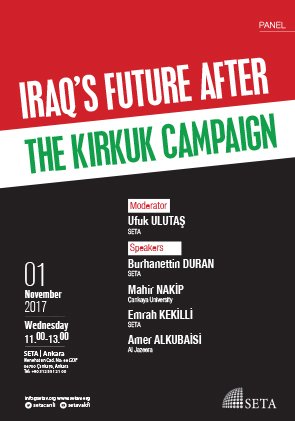Event
Iraq’s Future After the Kirkuk Campaign
- Date : 01/11/2017
- Time : 11:00 : 13:00
- Venue : SETA Ankara
- End : 01/11/2017
- Address : Nenehatun Cad No:66, 06700 Ankara,Türkiye
RSVPs & FOR DETAILED INFORMATION : Bünyamin Keskin - 0 312 551 21 22
- Moderator : Ufuk ULUTAŞ, SETA
- Speakers :Burhanettin DURAN, SETA
Mahir NAKIP, Çankaya University
Emrah KEKILLI, SETA
Amer ALKUBAISI, Al Jazeera
SETA’s panel entitled “Iraq’s Future after the Kirkuk Campaign”, organized by the Foreign Policy Research Department has taken place in SETA Ankara on November 1st, 2017. The panel attracted great interest among experts from academic, diplomatic, and bureaucratic circles, as well as from the media. The panel, which was moderated by SETA’s Foreign Policy Research Director Ufuk Ulutaş, enjoyed the participation of Amer al-Kubaisi of Al Jazeera, SETA’s General Coordinator Burhanettin Duran, Çankaya University faculty member Prof. Mahir Nakip, and SETA Foreign Policy Researcher Can Acun.
At the beginning of the program, Moderator Ufuk Ulutaş began by stating, “Turkey is making an effort to prevent a proxy war from breaking out in Iraq.” The first speaker, Amer al-Kubaisi, began with a short summary of Iraq’s relations with its neighbors. “Iraq and Saudi Arabia” al-Kubaisi explained, “had not had a border gate since 1991” and that the border had been recently reopened between the two countries. On the latest developments regarding the Faysh Khabur border gate between Northern Iraq and Syria, al-Kubaisi said that the Iraqi public was not very informed on the subject and that the gate was of more strategic significance to the US, as it was the major transit point for the assistance that it delivers to the PYD. Al-Kubaisi also noted that the Bashiqa issue had lost its influence on Turkish-Iraqi relations, and that “Following Turkey’s reasoned approach, Iraqi Prime Minister Abadi’s discourse will be determinant in the two country’s relations.”
In the panel’s second speech, SETA General Coordinator Prof. Burhanettin Duran, explained that Prime Minister Abadi should not make the same mistakes that characterize the Maliki era. Reiterating that regional players had adopted a common approach in support of Iraq’s territorial integrity, Duran noted that Barzani’s insistence on carrying out the referendum despite opposition from these players constituted a major misstep on his behalf. According to Duran, former President Masud Barzani became the losing side in the developments that led up to his resignation, while Abadi became victor, as a result of a variety of factors. Duran posited that Abadi position may be further strengthened in the future, due to the additional support it receives from the Ankara-Tahran axis, aside from the backing from the US in the context of the war against DAESH. Duran emphasized that Abadi needed to push for the peaceful coexistence of the Shia, Sunni, Turkmen, and Kurdish populations and noted that Abadi’s policies toward the PMU would have positive effects.
The panel continued with Prof. Mahir Nakip of Çankaya University speech focusing on the developments in Kirkuk. Nakip argued, “Kirkuk provides half of the Iraqi oil supply. Barzani attempted to suppress this region by ignoring the Turkmen” and that all of the prevalent issues essentially arise from the four basic unresolved problems relating to the Iraqi Constitution. According to Nakip, these problems were, first, the Kurdish control of the KRG border gates, second, “the position and military power of the Peshmerga coming to rival that of the Iraqi forces”, third, the energy resources of the region residing under the control of the KRG, and last, the lack of Iraqi authority over the Erbil and Suleymaniyah airports. Nakip stated that, “Kirkuk has been treated unjustly on the issue of energy. The main characteristic of Kirkuk as a city is its culture, not its energy resources” and continued, “Sectarian and ethnic politics will progressively lose traction in Iraq.” Nakip completed his speech with the argument that the reversion to the constitutional order in Iraq will pave the way for the reestablishment of a positive atmosphere.
Son olarak Acun, Türkiye’nin Abadi hükümetinden PKK’nın stratejik önem arz eden bölgelerden çekilmesini beklediğini ifade etti.
In the panel’s final speech, SETA Foreign Policy Researcher Can Acun argued that the international support enjoyed by the KRG would lose its legitimacy as DAESH’s gradual loss of territory continues. Referencing SETA’s own field research, Acun said that many contacts and meetings were realized within the scope of this study, and that they were aware of an agreement between the PUK and Barzani, took advantage of Jalal Talabani’s illness and internal disputes within the PUK. Acun explained, “In losing control of its borders, the KRG lost control of its oil sales. In this way, (the KRG) lost 70% percent of its income.” Acun also touched upon the issue of the PKK in Iraq, which, even if relinquishing control of some territory, continued to hold critical positions in areas such as Qandil. On this Acun emphasized that, “The KDP sees the PKK as a political rival, though it has yet to carry out any military action against it.” Lastly, Acun made the point that Turkey expected Abadi administration to assure the PKK’s retreat from strategic locations in Iraq.
